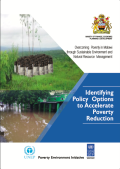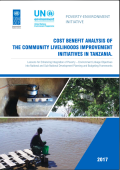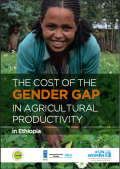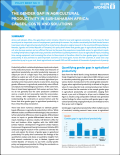
This report presents insights from a series of investigations to explore the poverty-environment nexus in Malawi and to identify sustainable pathways for poverty reduction by quantifying poverty and environment linkages. The study was commissioned by the Government of Malawi through the Ministry of Finance, Economic Planning and Development with financial and technical support from the UNDP-UNEP Poverty-Environment Initiative.

This report captures Poverty-Environment Initiative's 2016 achievements, as we gather the fruits of a more than decade-long effort to sow environmental sustainability into the field of development. It graphically highlights the work of the joint UNDP–UN Environment Programme global programme to improve climate resilience of the poorest and to effectively implement pro-poor environment practices and a just transition to a green economy and presents the kernel of a more effective means to achieving the 2030 Agenda for Sustainable Development.

The report presents findings of the economic analysis for the Pro-poor Economic Growth and Environmentally Sustainable Development Project, which is a joint venture between the Government of the United Republic of Tanzania and the United Nations Development Programme (UNDP), and the United Nations Environment Programme (UNEP).

This Report helps to lay the groundwork for deeper investigation as to where to invest for the most cost-effective policies. Our analysis finds that women’s lesser capacity to purchase pesticides, herbicides, and fungicides is an important constraint contributing to the gender gap in farm crop productivity in Ethiopia.

This policy brief shows that gender gaps in agricultural productivity do not arise because women are less efficient farmers but because they experience inequitable access to agricultural inputs, including family labour, high-yield crops, pesticides and fertilizer. Equalizing women’s access to agricultural inputs, including time-saving equipment, and increasing the return to these inputs is therefore critical to close gender gaps in agricultural productivity.
